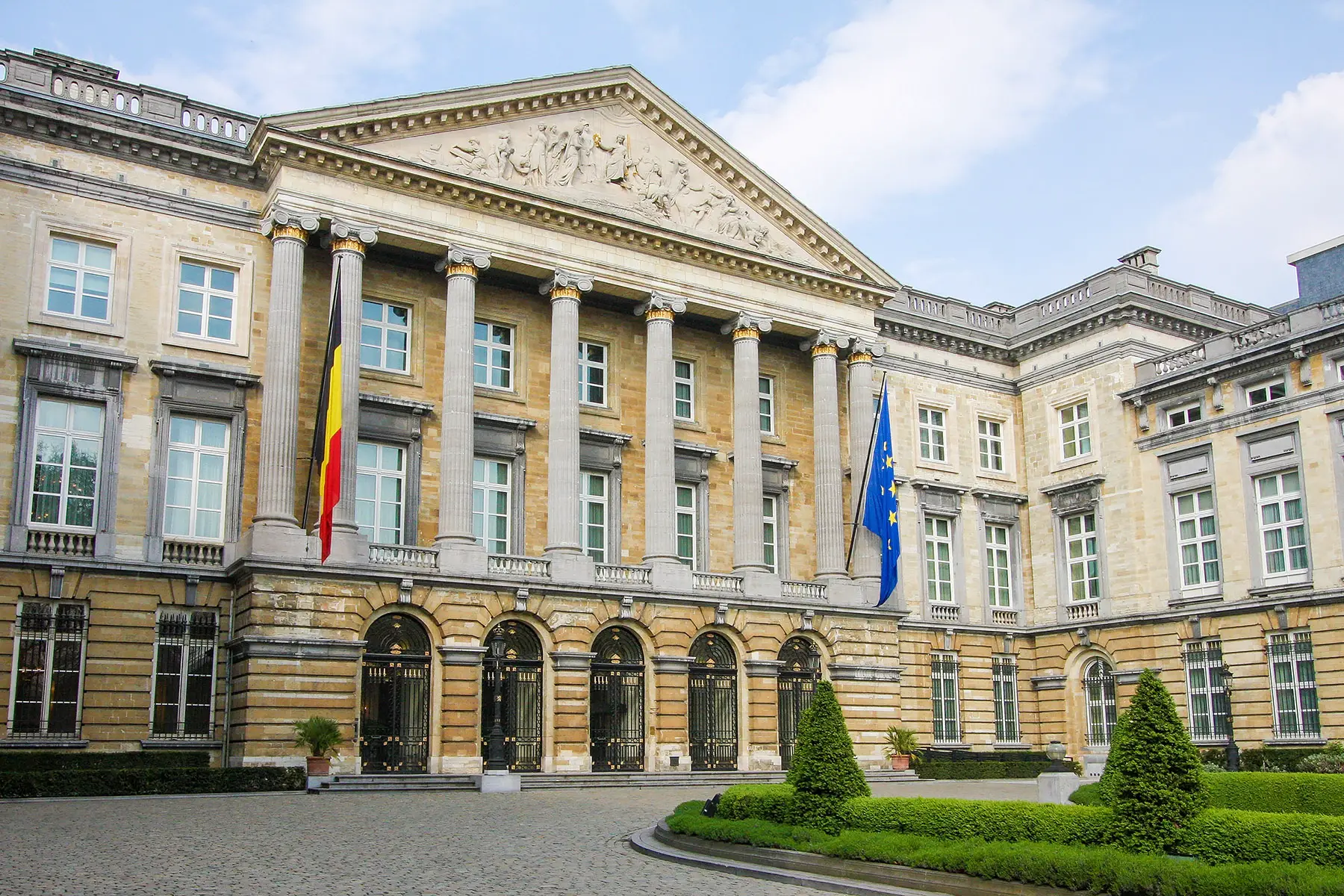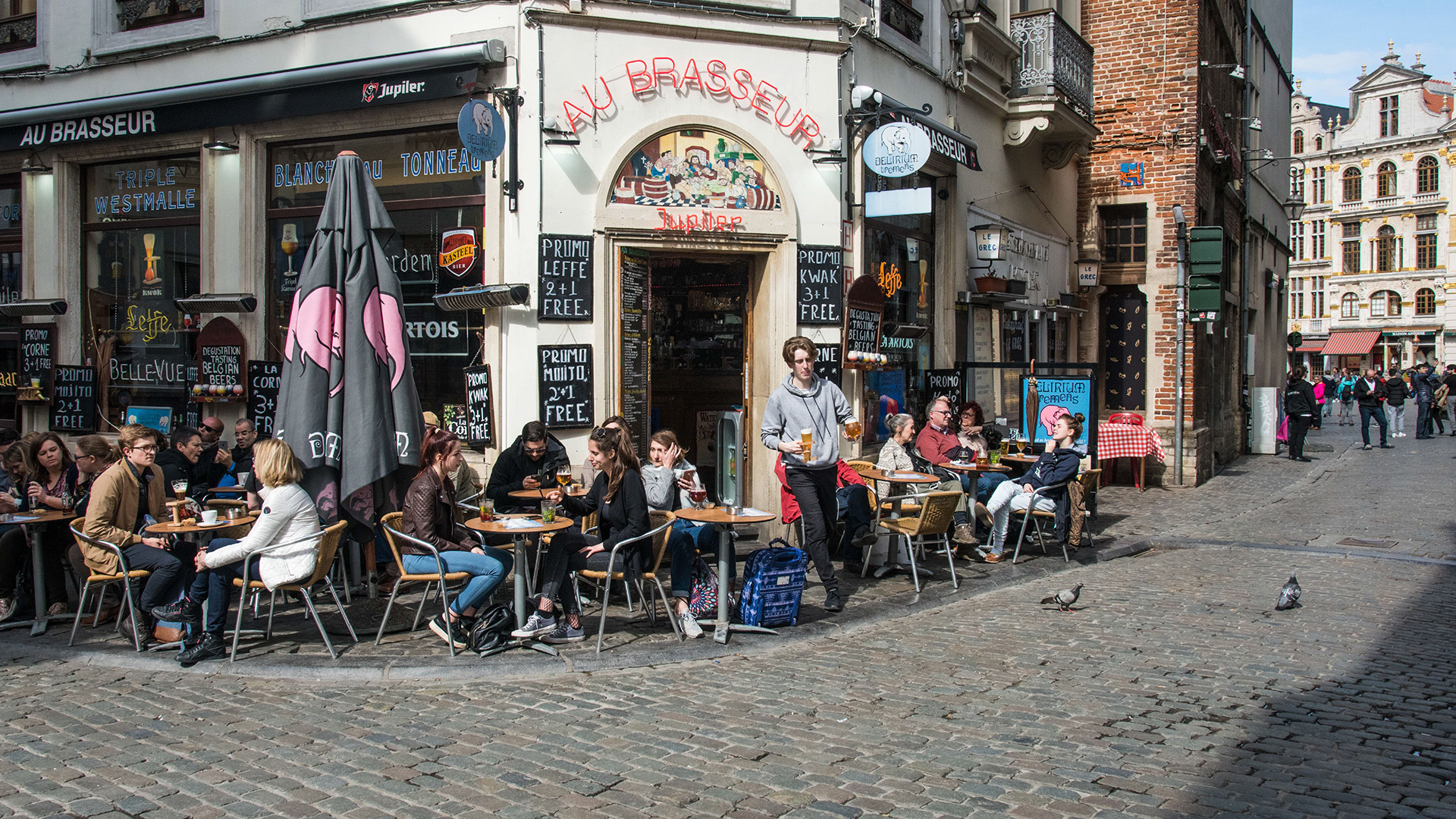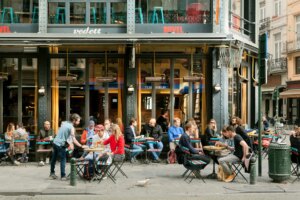With the state of the world as it is, you may want to close the blinds, take cover under a blanket, and watch reruns of Undercover. But, unfortunately, no one can hide forever.
In Belgium, keeping track of local and global happenings (Dutch: nieuws, French: actualités) requires little effort. The Belgian media landscape has plenty of options to choose from, allowing you to easily access multiple reliable news sources in Dutch, French, and German.
Read on to discover where to find the news in Belgium, including which news outlets to trust and which to avoid. Sections include:
Ground News
Get every side of the story with Ground News, the biggest source for breaking news in Belgium and around the world. This news aggregator lets you compare reporting on the same stories. Use data-driven media bias ratings to uncover political leanings and get the full picture. Stay informed on stories that matter with Ground News.
The media landscape in Belgium
Belgium’s news media is heavily structured along regional lines. Each of the country’s three regions – Dutch-speaking Flanders in the north, the French-speaking Wallonia in the south, and the German-speaking East Cantons – has its own distinct market, and there is little competition between them.
Because of this, the country has more media outlets than one might expect for its size. Unlike other countries worldwide, the Belgian news industry has grown over the last decade. Research company IBIS World reports that the market grew by 8.7% between 2020 and 2025. During that same period, the number of news agencies increased by 2.2%.

According to the Reuters Institute (2025), most people in Belgium consume their news online. Their 2025 survey finds that:
- 75% of Belgians source their news online (including podcasts and AI chatbots)
- 50% of people stay up to date by watching TV
- 37% use social media platforms to access current events
- 18% rely on print media to stay informed
Political bias of the Belgian media
The news in Belgium is generally reliable and factually accurate. Journalists in the country are expected to adhere to ethical standards set out by the Council for Journalism (Dutch: Raad voor de Journalistiek – RVDJ, French: Conseil de déontologie journalistique – cdj), which promotes journalistic integrity, independence, and self-regulation across the country.
However, that doesn’t mean that political bias doesn’t exist in Belgium. For example, the media concentration is dominated by a few large groups (Mediahuis and DPG Media in Flanders and Groupe Rossel and IPM in Wallonia), which influences editorial diversity. As late as April 2025, the Flemish Journalists’ Association (Vlaamse Vereniging van Journalisten – VVJ) expressed concerns about an editorial merger at Mediahuis, which would place two large newspapers under the same editor-in-chief.
Similarly, commercial news outlets often report from a particular political stance or angle. For instance, De Standaard is seen as center-left and socially progressive, while Het Laatste Nieuws leans more populist. On the Francophone side, Le Soir has a center-left reputation, while La Libre Belgique is considered more conservative.
Still, overt political allegiance is less pronounced in Belgium than in some other countries, and most outlets strive for balanced reporting. Make sure to always cross-reference your preferred news sources (e.g., with Ground News) and get a clearer picture of how stories are being framed.
Freedom of the press in Belgium
Belgium rates pretty high in terms of press freedom. The country ranks 18th out of 180 nations worldwide on the 2025 World Press Freedom Ranking, scoring 80.1/100. The RSF does warn that recent “censorship attempts have become a troubling development.”

Freedom of the press is protected by Article 25 of the Belgian Constitution, which guarantees independent journalism and prohibits any censorship. It also states that if the author is known and residing in Belgium, neither the publisher, printer, nor distributor can be prosecuted.
Despite this, journalists are sometimes subjected to intimidation and violence. Online threats are common and are often directed at female reporters and those with non-Belgian ethnic backgrounds.
Do the Belgians have trust in the press?
Overall trust in the media tends to fluctuate, and there’s a significant trust gap between Flanders and Wallonia. The Reuters Institute found that just 43% of the population sees the news as reliable (51% in Flanders and 35% in Wallonia).
The overall score is slightly above the world average of 40%. Finland remains the country with the highest levels of overall confidence (67%), while Greece (22%) and Hungary (22%) record the lowest levels.
In Belgium, the most reliable news sources are those belonging to the public media (i.e., VRT and RTBF), with 79% of Flemish and 67% of Walloon respondents saying they trust these outlets. In Wallonia, the news website 7sur7 is seen as the least truthful, with 21% of respondents saying they mistrust this news source.
Where to get the news in English in Belgium?
English-language newspapers and magazines
You can find plenty of English-language newspapers (Dutch: krant, French: quotidien), including The Guardian and The New York Times, at newsagents and kiosks in major cities in Belgium. Some may be a day out of date.
Alternatively, some international newspapers offer a subscription with home delivery, though it may be easier to subscribe to the online version.

Locally printed English-language daily newspapers aren’t available in Belgium. However, expats wanting to keep up with Belgian news should check out the bi-monthly magazine of The Brussels Times. This printed version of the news platform covers national politics, business, culture, and EU affairs.
English-language news websites and social media
If you prefer to get your news online, Belgium has several platforms that cover the news in English. Well-known outlets include:
- Brussels Morning – an independent, online-only newspaper that covers national news, EU affairs, and global issues
- The Brussels Times – arguably the most comprehensive English-language news source in Belgium
- The Bulletin – formerly a standalone print magazine, this website covers lifestyle, events, and services for the expat community
- Euractiv – based in Brussels, this news outlet occasionally covers Belgian topics when they intersect with EU policy
- Flanders News – the English-language website of the Flemish VRT News
- Politico Europe – like Euractiv, this news source is based in Brussels and is great for EU affairs (though perhaps less so for local Belgian news)
English-language TV, radio, and podcasts
Belgium doesn’t produce original English-language TV or radio news. However, a standard satellite or cable TV package will give you access to foreign English-language news channels, including reputable broadcasts like BBC World, CNBC Europe, CNN International, and EuroNews. You can also watch English-language news through TV apps and online streaming services.
Podcasts are another great source of online news and analysis. For example, Brussels in English is a short weekly report about life in the Belgian capital, covering things like restaurants, museums, and public transport.

Other recommended international news podcasts include:
- Global News Podcast – a BBC News podcast focusing on global news
- EU Confidential – a Politico podcast covering European news and politics
- Informationen am Abend – a German podcast from Deutschlandfunk
- Le journal de 19h – a French podcast from Radio France
- Morning – an Italian podcast from Il Post
- The Daily – an American podcast from the New York Times
- Today Explained – an American podcast from Vox Media
Where to get the Dutch and French news in Belgium?
National and local newspapers and magazines
Belgium has around 23 daily and at least three weekly newspapers. These include both free and subscription-based papers, published in Dutch, French, and German.
Here are some of the biggest sellers (in alphabetical order):
- DH Les Sports+ – a tabloid-style, slightly more populist daily newspaper in Wallonia that covers sports and local news
- L’Echo – a financial daily in Wallonia covering economy, business, and markets
- Grenz Echo – the only German-language daily in Belgium; its coverage is broadly centrist with a Christian, independent editorial stance
- Het Laatste Nieuws (HLN) – Flanders’ most well-read tabloid newspaper with a center-right political leaning
- La Libre – reporting on politics, opinion, and business, this title has a center-right standpoint and tends to support the Christian Democratic parties
- De Morgen – a left-wing daily paper in Flanders that focuses on progressive politics, investigative journalism, and culture
- Het Nieuwsblad – a daily title in Flanders, popular for its sports coverage and strong local inserts
- Le Soir – Wallonia’s most popular daily paper covering politics, culture, international news; it has a center-left bias
- De Standaard – a center-left newspaper in Flanders known for its high-quality reporting on politics, society, and international affairs
- De Tijd – similar to L’Echo, but for Dutch-speaking readers
Regional or local newspapers
According to the Reuters Institute, just 13% of French-speaking Belgians read a local or regional weekly newspaper. Still, it’s one of the most respected sources of news, with 67% of Flemish and 54% of Walloons deeming it trustworthy.

Beyond the big-selling region-specific dailies, Belgium has a strong network of smaller local papers targeted at its cities and provinces. The biggest of these are L’Avenir and Sudinfo, which both publish in French.
Other popular local newspapers include:
- Gazet van Antwerpen (GVA – Antwerp)
- Het Balang van Limburg (Limburg)
- La Capitale (Brussels)
- La Meuse (Liège)
- Waaskrant (Waasland)
- Krant van West-Vlaanderen (West Flanders)
Weekly or periodical newspapers or magazines
There is a wide range of weekly and monthly publications that can help keep you up to date with the latest news. Seemingly, if you have an interest, you’ll be able to find a magazine dedicated to it.
Some of the larger titles in Belgium include:
- Business and finance: e.g., De Belegger, La Lettre B, and Trends/Tendances,
- Lifestyle and entertainment: e.g., Feeling/Gael, Flair, Humo, and L’Officiel
- News and politics: e.g., Apache, Imagine Demain le Monde, Knack, MO*, and Le Vif
- Sports: e.g., Sport Voetbalmagazine/Le Sport Sport Foot Magazine and Wilfried
Belgian news websites and social media
Belgium is one of the more tech-savvy European nations, and its citizens have embraced digital news. Online news is now the country’s most popular news medium, with 75% of Belgians keeping informed this way. Indeed, virtually all the major news platforms have an online presence. Many are free to access, though some have hidden their content behind a paywall for subscribers only.
Around 16% of Belgians pay for online news, and 5% listen to podcasts to stay informed about the news (Reuters Institute).
The most commonly used news websites in Belgium include:
- DH Les Sports+ – website of the sports tabloid
- GVA – website of the popular regional paper
- HLN – website of the popular tabloid paper
- De Morgen – website of the progressive paper
- Nieuwsblad – website of the daily newspaper
- RTL Info – online news platform covering news, sport, and entertainment
- RTBF Actus / VRT Nieuws – website of the public broadcasting service
- De Standaard – website of the center-left newspaper
- Sudinfo – website of the regional newspaper collective
- Tijd – website of the financial paper

In January 2025, Belgium had 8.98 million social media users, which is roughly 76.4% of the population. Around 37% of these also use it to stay up-to-date with current events. According to the Reuters Institute, the most-visited social media platforms for online news are:
- YouTube
Although social media can be great for quickly disseminating news stories and getting unfiltered information, it does come with its own risks. Because posts are not editorially filtered for factual accuracy, fake news and disinformation can spread quickly on social media.
The Belgian government has introduced several initiatives to combat fake news and disinformation, including a 2024 “Is That True?” campaign, which features notable influencers. You can find more information on the government website Mediawijs.
Belgian TV, radio, and podcasts
Belgian TV and radio are regulated by the Flemish Media Regulator (Vlaamse Regulator voor de Media – VRM) and the Audiovisual Council (Conseil supérieur de l’audiovisuel – CSA).
Similar to the printed press, broadcast news in Belgium runs along regional lines. The public broadcasters BRF (East Cantons), RTBF (Wallonia), and VRT (Flanders) host 12 TV channels and 15 radio stations, with programming in Dutch, French, and German. Large brands like DPG Media and Play Media also own several commercial TV stations, including LN24, VTM, and RTL-TVI.
The most popular TV news program in Wallonia is La Une (RTBF), with 40% of people watching it every week. In Flanders, the most popular TV news program is RTL Info, watched by 31% each week.
Despite the rise of other media, radio remains well-liked in Belgium. In 2021, 91.7% of the population listened to the radio, with 69.3% doing so daily. The BRF/RTBF/VRT operates the main public news stations: BRF1, BRF2, La Première, Radio 1, Radio 2, and VivaCité. Private radio stations are aplenty and include Bel RTL, Joe FM, MNM, Qmusic, and Radio Contact, just to name a few.

Roughly 5% of Belgians also listen to news podcasts. Some top-ranking titles include:
Alternative news and citizen journalism in Belgium
Belgium’s French-speaking communities, in particular, have a long-standing tradition of independent media and citizen journalism. Although the overall media landscape is dominated by large corporate owners, there are several alternative platforms that challenge mainstream narratives and spotlight local issues.
Notable examples include:

Another great source of “alternative news” is satire. While there are regional differences, of course, the Belgian sense of humor is typically self-deprecating, dry, and absurd. They also love sharp wordplay and dark comedy, so if you’re looking for a wry take on current events, you’ve come to the right place.
Popular examples include:
- Agent 212 (comic, 1975–present)
- Les Cités obscures (comic, 1982–present)
- HUMO Magazine
- ‘t Pallieterke
- Parlement (TV, 2020–2024)
- TV Belgiek (TV, 2006–present)
News sources to avoid in Belgium
Doorbraak is an opinion-heavy news site in Flanders, which is often accused of platforming divisive narratives. Its reporting is politically slanted to the nationalist and conservative right, and, while not fake news, it’s considered extremely ideological.
Flemish blog Sceptr.net is similarly agenda-driven. This conservative news platform amplifies conservative, anti-woke, and anti-establishment stories, which are at times misleading or unverified.
The right-wing online newspaper Le Peuple is another less-than-reputable news source, often featuring nationalist or conspiratorial views. The paper lacks editorial transparency and professional accountability, and should definitely be avoided.
Tips on getting reliable news in Belgium
There are some resources out there specifically designed to help you assess news articles and sources for accuracy, bias, and reliability. Some of the services operating in Belgium include:
The key to stopping the spread of misinformation is learning how to spot it. Here are some top tips from the experts:
- Develop a critical mindset when following news coverage. Instead of relying on just one source, cross-check different news platforms across the political divide.
- Consider what might be missing from the news report; fake news often leaves out information
- Check several sources before sharing news stories with friends and family members. Don’t trust expert quotes that only appear on one news source; they may be false or taken out of context.
- Research the accuracy of images by reverse-searching for them on your search engine. for fake images. Doing this allows you to see where the picture originated. For example, a photo going viral on social media today might actually be several years old.
- Always check the website’s URL. Scammers often create copycat websites to misinform, promote dodgy products, or phish for your information.
Useful resources
- European Digital Media Observatory (EDMO) – website of the EU’s largest network to counter fake news and misinformation
- National Crisis Center – official government website explaining disinformation, with links to more resources
- EU Disinfo Lab – website of the non-profit organization that can help you spot fake news
- Flemish Journalists’ Association – website of the professional association for reporters in Flanders
- Professional Journalist Association (Association des Journalistes Professionnels – AJP) – website of the professional association for reporters in Wallonia










